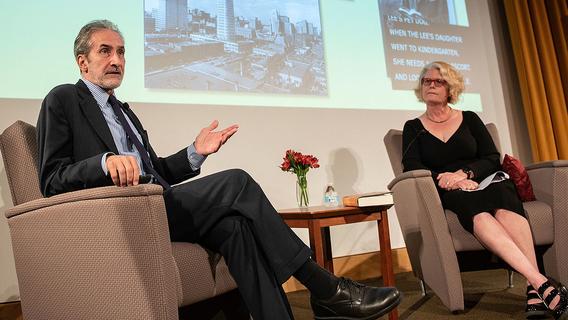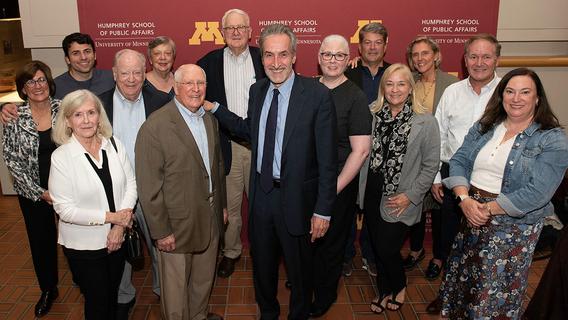
A book talk and reception for Samuel Freedman, author of Into The Bright Sunshine: Young Hubert Humphrey And The Fight For Civil Rights, last month at the Humphrey School of Public Affairs felt a bit like a reunion, with members of the Humphrey family as well as collaborators and supporters in attendance to celebrate.
Freedman’s book delves into the early years of Hubert Humphrey’s political career, from his time as mayor of Minneapolis as he tackles the city's notorious racism and anti-Semitism, to his role as a national champion of racial justice that transformed the Democratic Party and the entire nation.
Although his book was published in July, Freedman said he has looked forward to this event at the Humphrey School for "many months." It was co-sponsored by the University Libraries.
Humphrey School Dean Nisha Botchwey noted that Freedman spent a great deal of time in the Humphrey School building as he researched and wrote his book.
“He’s been a dear friend of the Humphrey School and the Humphrey family, to all of us who are committed to exploring the historic work of our school’s namesake,” she said. “Sam meticulously uncovered the nuances of this pivotal moment in history, a moment when a relatively unknown mayor from Minneapolis took center stage and helped steer the Democratic Party, and our nation, towards embracing civil rights.”
“I could not have written this book without the Humphrey School and the University of Minnesota,” Freedman said, thanking archivists at the Humphrey School and researchers at the University Libraries for their assistance. “Humphrey’s family members have been generous with their time and gave me their permission to use Hubert Humphrey’s personal papers, which was essential to this project. They have been supportive in myriad ways.”

Kirsten Delegard, co-founder of the University Libraries’ Mapping Prejudice Project, moderated the book discussion with Freedman.
She described a line from Humphrey’s 1948 speech at the Democratic National Convention—“The time has arrived in America for the Democratic Party to get out of the shadow of states' rights and walk forthrightly into the bright sunshine of human rights."—as a high point for American political oratory.
“Hubert Humphrey’s courage [in making that speech] changed the course of American history,” said Delegard. “It catapulted him into national politics; he served in the U.S. Senate, shepherded the Civil Rights Act through Congress, was vice president, and ran for president twice.”
Here are some key points from the discussion, edited for clarity.
Humphrey’s story is a reminder that Minneapolis has long struggled with bigotry.
Sam Freedman: Minneapolis and the University of Minnesota were steeped in racism and antisemitism that didn't really get addressed until Hubert Humphrey became mayor in 1945. The leaders of the city were complacent about the situation before then; they would go after the extremists but leave the enablers alone.
How does Humphrey get involved?
SF: Hubert Humphrey was awakened to racism and antisemitism in Minneapolis from his years as a student at the University of Minnesota. As he becomes active in local politics, he seeks out more education from leaders in the Black and Jewish communities. He became good friends with Cecil Newman, founder of the Minneapolis Spokesman newspaper, and Sam Scheiner, a Jewish lawyer who was essentially a one-man anti-defamation league.
At that time, Jews and Blacks made up only 3 percent of the city’s population, and neither Newman nor Scheiner had any political power. But they had knowledge and context they could share with Humphrey, who had political skill and power. They understood that the battles against racism and antisemitism were one battle.
Humphrey surrendered his white Christian privilege to toil alongside Blacks and Jews against discrimination and bigotry. With his upbringing, in an overwhelmingly white, Protestant, conservative Republican family and city, he was the least likely person to become a champion for Blacks and Jews.
Black leaders in Minnesota remained loyal to Humphrey, even in his later years. Was it merited?
SF: Totally. I wrote about a Black minister who talked about people who “were always there.” And Humphrey had “there-ness” on racial issues. He was standing up on these issues when no other white people were doing so. The two most important white partners at the time were Hubert Humphrey and Eleanor Roosevelt. Black people remembered that. Lyndon Johnson didn’t come around until the late 1950s, and Robert Kennedy was a late arrival on these issues, too.
I read the mail that Humphrey received from Black people all across the country. Two weeks after his DNC speech, Truman desegregated the military and federal workforce. So there were concrete results almost immediately. Humphrey began the process of the Democratic Party becoming an inclusive, interfaith, multiracial party, and that’s what set the table for the civil rights legislation of the 1960s.
That mattered more to most Black voters than the criticisms of Humphrey in later years because of his support for the Vietnam War.
Minneapolis is once more notorious for George Floyd’s murder. Is this us going back to the 1940s?
SF: From the epilogue to the book: "Do the shadows and dust storms triumph over bright sunshine in the end? ... Is America continuously engaged in 'the unfinished task of emancipation'?
"The national endeavor to achieve a full, inclusive democracy proceeds not with inexorable advancement, but through cycles of oppression, resistance, liberation, reformation and retaliation. Ground can be lost but ground can also be gained, inches at a time, and with tenacious effort, it can be held.
"For all his flaws and failures, Hubert Humphrey had committed his life to the grinding work of trying."
Watch video of the discussion See photos from the event

